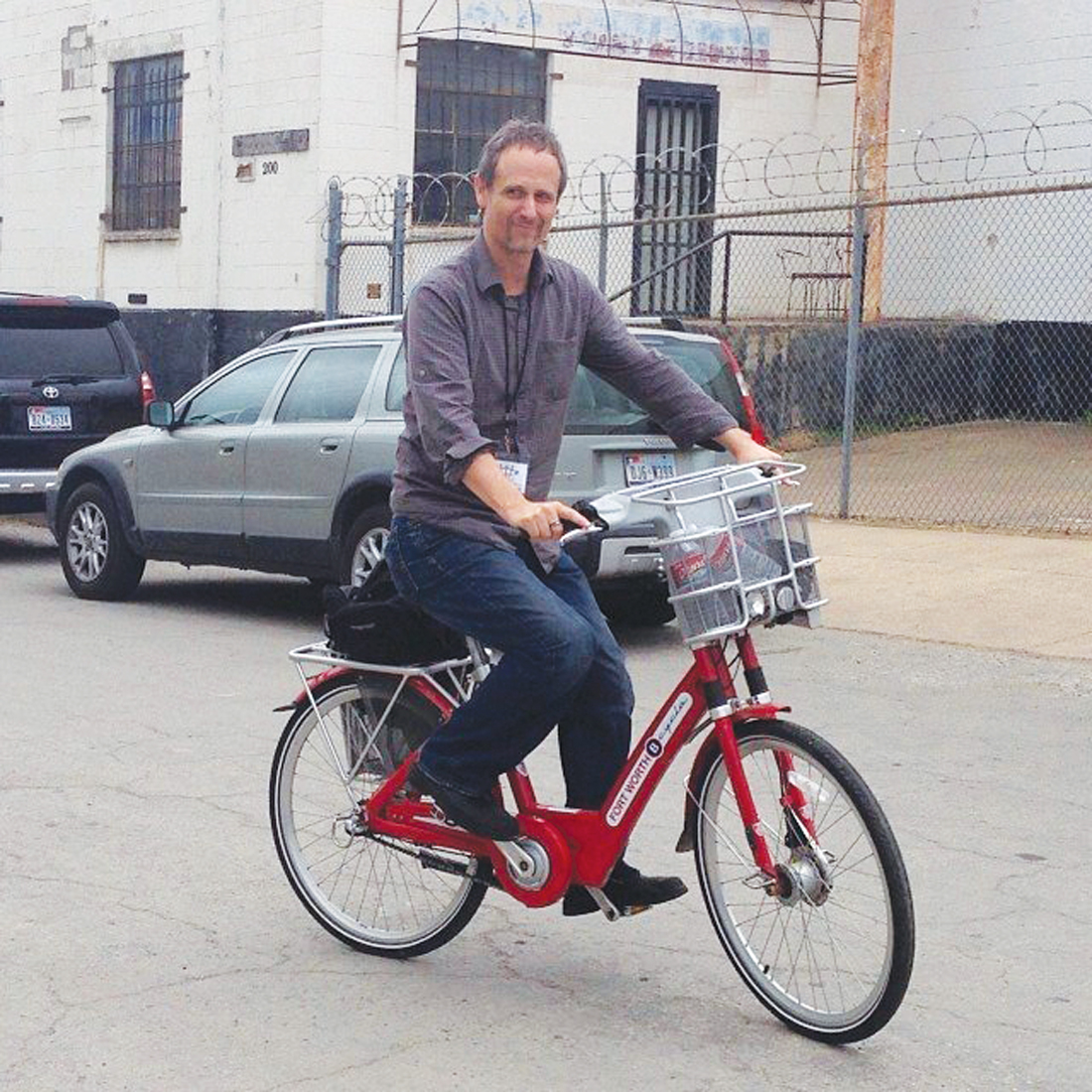The nonprofit Fort Worth Bike Sharing turns a year old this month, but some people just haven’t figured out what it’s all about yet.
The bike-sharing rack near the Shipping & Receiving Bar on the Near Southside seemed like a great deal to local filmmaker Tom Huckabee, who helped organize the recent Wildcatter Exchange two-day event. Activities were spread over several blocks around South Main Street.
“I had announced at a staff meeting that I was going to rent a bike because the rack was right there in front of Shipping & Receiving where we were having our meetings,” he said. “The venues were about a five- or six-minute walk away, and I thought it would be convenient.”
An ATM-style payment machine sits beside the bike rack. Huckabee saw something about $8 for a 24-hour rental and fed the machine his credit card. “I don’t have a bicycle and haven’t ridden one in a while, and I thought it would be fun,” he said.
He was right. Huckabee had a blast and was a familiar sight that Saturday afternoon, pedaling around on a bright red bike. He stashed the two-wheeler inside the various venues to prevent theft while attending performances. At the end of the day, however, Huckabee got a surprise. The ATM machine charged him $64.
“I was outraged,” he said.
And so he did what outraged people do these days –– he posted a complaint on his Facebook page: “The contract said 24-hour membership fee: $8. I was in a hurry, so I thought that meant I could have the bike for 24 hours for $8. I didn’t bother reading the rest, and ended up having to pay $58 in ‘usage’ fees. Who in the world would willingly pay $64 to rent a bicycle for a few hours? Yes, it was my own damn fault, but one wonders if the bike sharing business model doesn’t depend on fleecing fools like me.”
Comments poured in. At first people were sympathetic. But then several bike-sharing enthusiasts piped up.
“It is the same model used in every major city across the country that has a bike share system,” one person commented. “It is not a scam created to dupe people out of their money. Fort Worth Bike Sharing is a nonprofit 501(c)(3) organization that very effectively provides bicycles for a large amount of people at relatively low cost. IT IS NOT A RENTAL.”
As it turns out, educating the public is one of Fort Worth Bike Sharing’s top priorities. Huckabee’s unhappiness wasn’t isolated. Payment criteria are spelled out on the ATM machine, although they’re not terribly easy for a first-time user to understand, reminiscent of the headaches caused a few years ago when parking pay stations were introduced downtown.
At least one new customer a day calls the bike-sharing office to complain of being charged more than expected. Executive Director Kristin Camareno provides a partial refund and uses the opportunity to explain the system.
“One of the biggest lessons learned for us is how important it is for us to educate people as to the difference between bike renting and bike sharing, mainly because bike sharing is so new,” she said.
Europeans have been using bike sharing for many years, but the concept didn’t make its way to the United States until a few years ago when the first program was created in Washington, D.C. Not long afterward, a program was established in Denver. Since then, about 40 bike-sharing programs have gained footholds across the country. Almost all are nonprofit or government-funded and are intended to encourage cycling as another method of public transportation.
“We got in on the forefront, but luckily there were a couple of systems that I could piggyback off of, idea-wise,” Camareno said.
Bike sharing reduces the need for cars and makes it cheap and easy for someone to tool around urban areas for quick trips to restaurants, bars, shops, and museums. During its first 11 months, the local program is credited with 91,000 pounds of carbon offset, 3.8 million calories burned, and almost 100,000 miles traveled.
It’s the sharing part that confuses some people. The $8 payment buys a one-day membership. A customer may use the bike an unlimited number of times during that 24-hour period without incurring additional fees, but only for 30 minutes at a time.
The idea, in other words, is for a member to use the bike for a short excursion and turn it in as soon as the destination is reached. When the cyclist is ready to leave that destination to go home or on another errand, he or she checks out another bike. This leaves plenty of bikes available at the 34 racks around the city. Some people ride the Trinity Railway Express from Dallas to Fort Worth and then grab a shared bike to pedal deeper into downtown.
“Bike rental and bike sharing are different beasts,” Camareno said. “Bike sharing serves a larger number of people than you have bicycles.
“You want people to be making short trips between stations,” she said. “They don’t have to haul the bike with them. They don’t have to maintain the bike. They go to a station, dock the bike, go to their meeting, come back out, get another bike.”
Annual memberships cost $80 and offer huge savings for anyone who uses the bikes regularly. A membership comes with a plastic card that a user can simply swipe across a reader on the rack to instantly release a bike. It’s much quicker than using the payment machine each time.
Still, most people buy the 24-hour memberships. Fort Worth Bike Sharing began offering bikes to the public last April 22. Since then, only about 500 people have purchased annual memberships, while around 12,000 bought the 24-hour version.
About 300 bikes are currently spread out among the stations. The three-speed bikes feature women’s-style frames (sans the top bar) and adjustable seats. The bikes are heavy duty and durable and can handle even Camp Bowie Boulevard’s bumpy brick surface with little jostling. Each bike has a basket for storing a briefcase, small amounts of groceries, or other items.
Local architect Gannon Gries signed up for an annual membership shortly after the program began. Each morning he walks from his house in the Park Place neighborhood to a nearby bike station and checks out a bike for the 15-minute ride to another station on West 7th Street. Then he walks two blocks to his office. The whole trip takes about 20 minutes and allows him and his wife to get by with only one car.
“It’s one of the cheapest memberships we have,” he said. “It’s a huge value to be able to pick up a bike whenever you want, drop it off, and not have to worry about anybody vandalizing or stealing it.”
More bikes and racks are on the way. This fall the organization is using a $500,000 federal grant to add 60 bikes and 10 new stations, including on the city’s East Side and in the Stockyards district.
Camareno worked for years as a property manager with the Fort Worth Transportation Authority, and she often heard bus passengers ask for some sort of bike storage or bike rental. Her research in 2012 revealed several bike-sharing programs that had popped up in large metropolitan areas, including one in Houston.
A $1.2 million federal grant that year kickstarted Fort Worth’s program. In addition to Camareno, the nonprofit employs two full-time and four part-time workers. Each bike includes a GPS system that can be tracked by computer.
“The kiosk communicates by satellite to the GPS in the bikes and to our software,” Camareno said. “At any time we know how many bikes are out, how many are docked, who has a bike, how long they’ve had it out, where they went from and to. It helps us to recognize trends and see where people are going and where we might want to put another station or to move a station if it’s not being used.”
Annual operating costs are about $450,000. So far, membership and usage fees are providing about 40 percent of that amount, while private donors and sponsorships make up the rest. Most of the bikes have advertising placards on their baskets.
Vestar, a retail property management company in the West 7th corridor, paid for a bike station to be placed on that busy street. “We felt like it was a worthy cause,” said Vestar General Manager Max Holderby. “Long-term, it will help connect us to the rest of the Cultural District, the university, and the [University of North Texas Health Science Center], as well as downtown.”
The city provides no funding for the program, although city officials waived some fees to help get it going. The program goes hand in hand with city leaders’ efforts to reduce sprawl by attracting residents back to inner-city areas.
“A lot of young professionals don’t want to have to have a car anymore. They want to be able to bike and ride and use public transportation,” Camareno said. “It’s a culture shift, and this is a piece of it.”
Even Huckabee has become a fan despite feeling fleeced after his first ride.
“I’ve come to admire and understand the system,” he said. “They could probably make it a little easier for stupid people to understand. I was in a hurry. If I had read the next line in the instructions –– and there were instructions all over the place –– I wouldn’t have had a problem. Hopefully your article will save a lot of people from making the mistake that I made.”












For eight bucks I’ll fix my bike. Or skate.
Ice skate? You crazy.
If you are a annual member it costs only $80 a year (about $6 and change each month) and that’s for unlimited number of rides. You could grab a bike from a rack a dozen times a day and it wouldn’t cost you a thing because you’ve already paid your annual membership. It’s very cost effective for members.